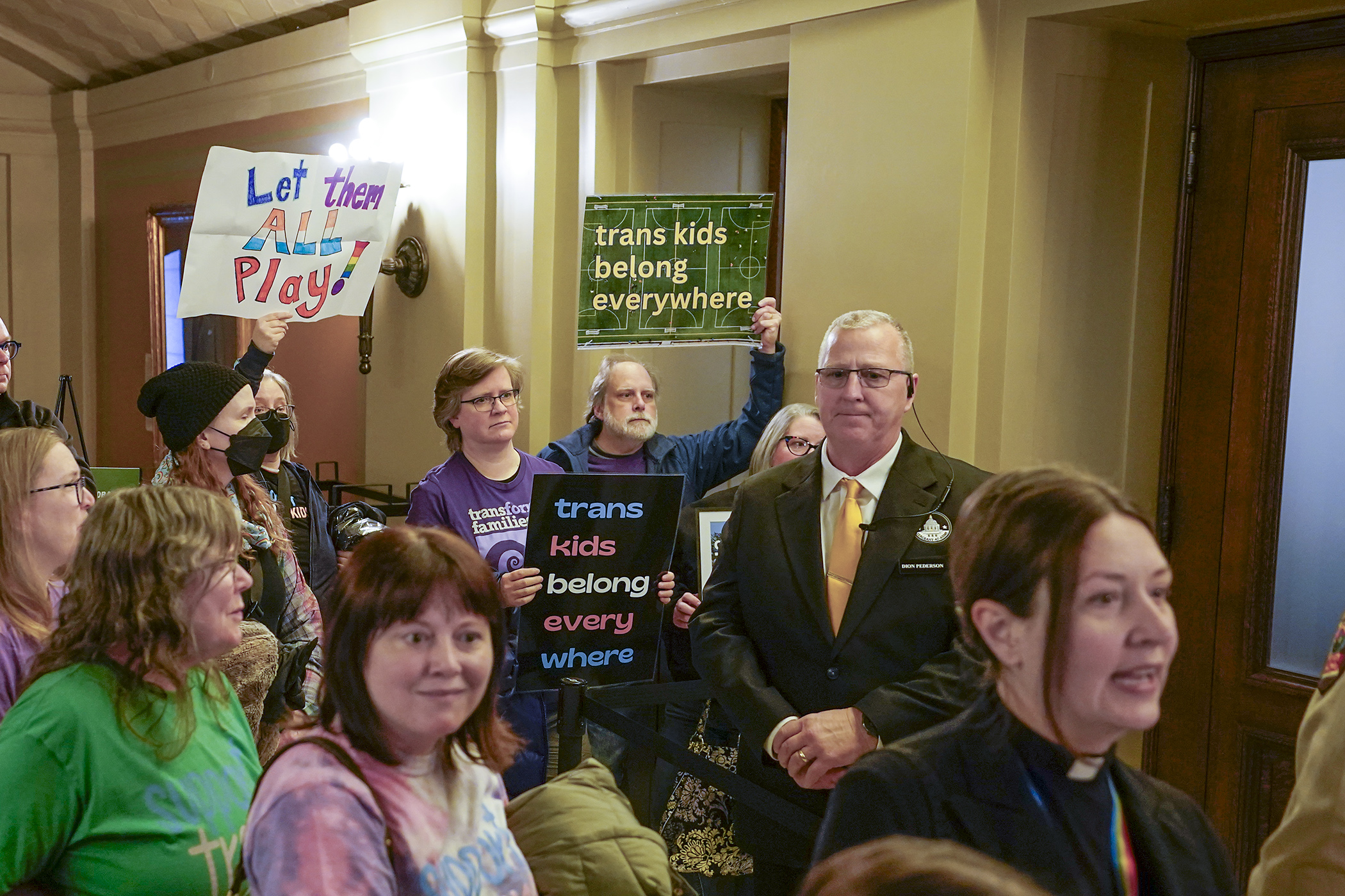House education panel approves bill to ban transgender athletes from girls' sports

— UPDATED at 7:58 p.m. with committee action
A mile or so away from the State Capitol, the state high school girls’ hockey tournament got underway Wednesday.
Up the hill, lawmakers were having an off-ice battle over who should be allowed to participate in the games.
A Feb. 5 presidential executive order bans transgender girls and women from competing in girl’s and women’s sports.
Minnesota State High School League officials did not act on the order right away, arguing it violates state law because the state’s Human Rights Act and the Equal Protection Clause of the constitution prohibit discrimination against any person in any protected class, including sexual orientation and gender identity.
In a statement, the league said: “The Executive Order requires a 60-day window for athletic associations to convene and take action implementing the order. Given the significance of the issue, the League is considering requesting a formal opinion from the Minnesota Attorney General for guidance on the issues involved.”
On. Feb. 12, the federal Education Department said high school leagues in Minnesota and California will be investigated “to ensure that female athletes in these states are treated with dignity, respect, and equality that the Trump Administration demands.”
Rep. Peggy Scott (R-Andover) is sponsoring a controversial answer to the issue.
As amended, HF12 is being referred to as "Preserving Girls' Sports Act."
 Laurel Audette, a ninth-grade student-athlete, testifies before the House Education Policy Committee in support of HF12. Sponsored by Rep. Peggy Scott, left, the bill would restrict female sports team participation to females as determined by genetics and with respect to the reproductive system. (Photo by Michele Jokinen)
Laurel Audette, a ninth-grade student-athlete, testifies before the House Education Policy Committee in support of HF12. Sponsored by Rep. Peggy Scott, left, the bill would restrict female sports team participation to females as determined by genetics and with respect to the reproductive system. (Photo by Michele Jokinen)It states “only female students may participate in an elementary or secondary school level athletic team or sport that an educational institution has restricted to women and girls.”
Per the bill, “’Female’ means a female as biologically determined by genetics and defined with respect to an individual's reproductive system.”
This hot button topic was debated before a standing-room only meeting of the House Education Policy Committee Wednesday before, after a recess, it was approved on a 7-6 party-line vote and sent to the House Floor.
Among supporter arguments is biological differences between genders, which can ultimately lead to better results for someone born male and increased injuries for a female; team spots being taken by a non-biological female; and the locker room being a place where girls should feel protected.
One mother spoke of a broken wrist suffered by her 11-year-old daughter who was knocked down by a male.
“I hope there needs to be no more broken bones to show this is a broken system,” said Leanna Chambers, who played tennis and was a competitive swimmer in high school. She also expressed concern of different sexes sharing a locker room.
Kaia Hill was a three-sport high school athlete, a two-sport collegiate athlete, a head girls basketball coach and assistant high school athletic director.
“My athletic experience has shown me one thing very clearly: boys and girls are different. If that wasn’t true, Title IX wouldn’t have been needed in the first place,” she said. “Title IX gave the girls the opportunity to have their own teams like the boys had. Those who was to allow transgender athletes or biological males to play in girls sports refuse to admit the serious consequences that come with this decision. … Girls have fought so hard to get to where they are now. If we don’t protect girls sports now, we will be undoing the progress we fought so hard for.”
Rep. Alex Falconer (DFL-Eden Prairie) said the bill would allow trans discrimination and is rife for abuse.
“Apparently, any parent, coach, person in the stands can call to question somebody’s gender, somebody’s sex, and remove them from the court,” he said. “… This bill denies kids the opportunity to find their purpose, to find their place in schools, denies them to find the team they can identify with, causes significant mental damage when this group of people already face disproportionally higher mental health issues leading to societal ideation and suicidal attempts. This is a dangerous bill. … It’s going to lead toward discrimination and harm.”
Rep. Julie Greene (DFL-Edina) thinks there would be problems with no all-encompassing sports committee overseeing bill implementation. “The Minnesota High School League does not cover elementary level students, so that seems to be a contradiction in the bill.”
Kat Rohn, executive director of OutFront Minnesota, says the bill is an attack on trans women and girls who have been playing sports under the current MSHSL policy for more than a decade without issues.
“When trans kids aren’t allowed to play as who they are, they stop participating,” Rohn said. “This bill singles out trans kids, but the harms of the bill will be felt much more widely.”
— Assistant Director/Editor Mike Cook and Assistant Editor Lisa Kaczke contributed to this story.
Related Articles
Search Session Daily
Advanced Search OptionsPriority Dailies
Speaker Emerita Melissa Hortman, husband killed in attack
By HPIS Staff House Speaker Emerita Melissa Hortman (DFL-Brooklyn Park) and her husband, Mark, were fatally shot in their home early Saturday morning.
Gov. Tim Walz announced the news dur...
House Speaker Emerita Melissa Hortman (DFL-Brooklyn Park) and her husband, Mark, were fatally shot in their home early Saturday morning.
Gov. Tim Walz announced the news dur...
Lawmakers deliver budget bills to governor's desk in one-day special session
By Mike Cook About that talk of needing all 21 hours left in a legislative day to complete a special session?
House members were more than up to the challenge Monday. Beginning at 10 a.m...
About that talk of needing all 21 hours left in a legislative day to complete a special session?
House members were more than up to the challenge Monday. Beginning at 10 a.m...